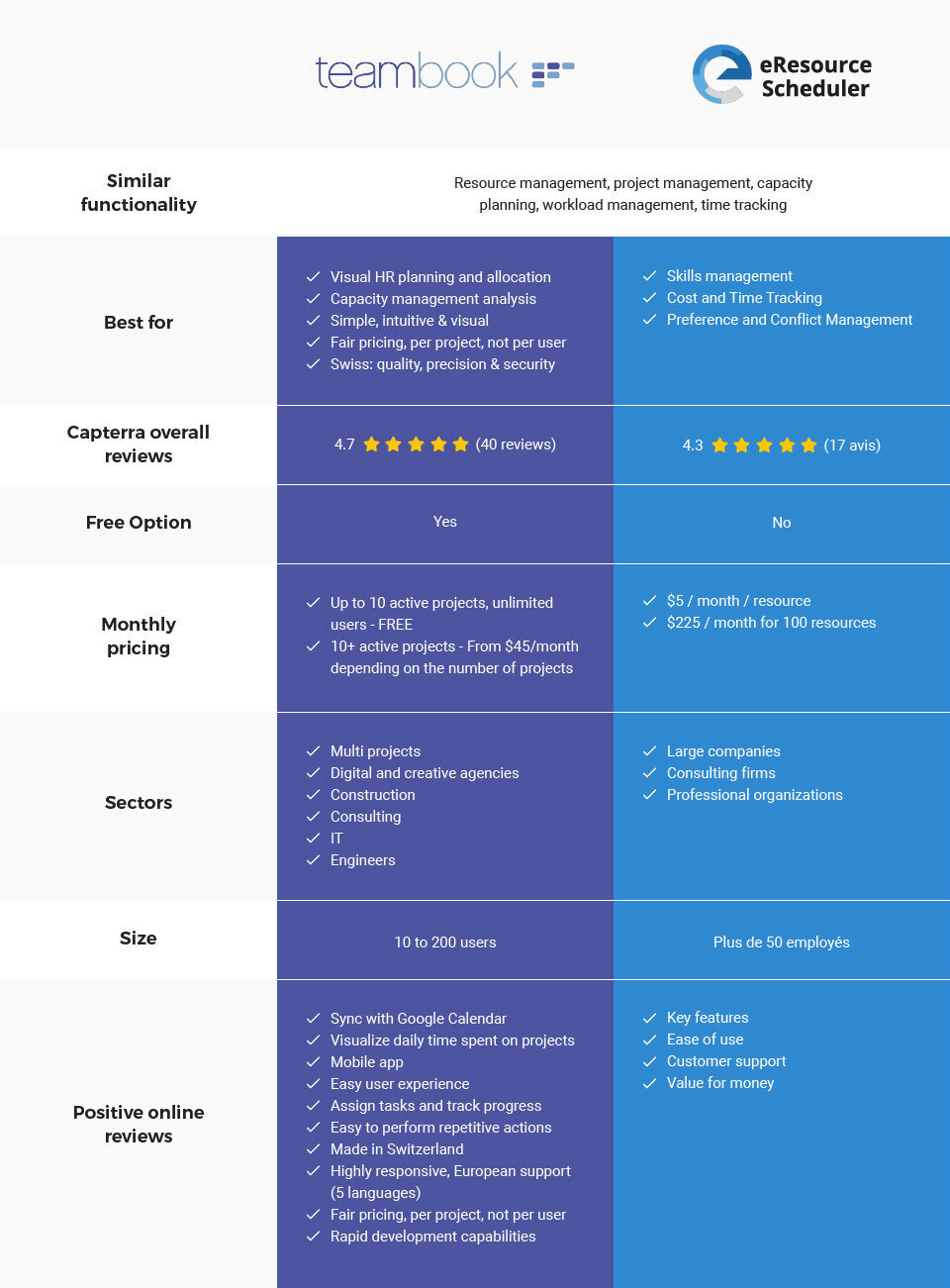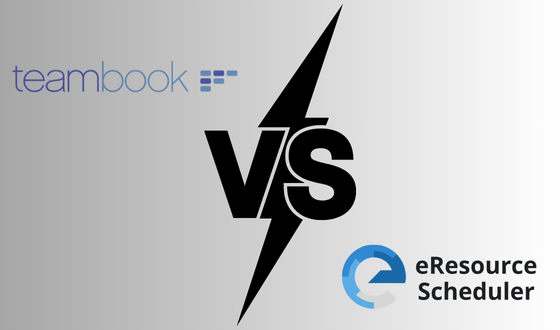Table of Contents
ToggleTeambook VS eResource Scheduler: which resource management tool should you choose?
If you’re looking for resource planning software, but you’re undecided, here’s a comparison of 2 tools: Teambook and eResource Scheduler.
Each has its advantages and disadvantages. That’s why you need to choose the tool that is best suited to your company’s needs.
Here’s a comparison of these two resource planning tools which will certainly help you make your choice.
Teambook VS eResource Scheduler: which one to choose?
Teambook and eResource Scheduler are two resource management and project planning tools, but they differ in terms of functionality, objectives and features. Here is a detailed comparison of the two.
Teambook VS eResource Scheduler: what they have in common
Teambook and eResource Scheduler, although different in their approach and target audience, share a number of common features as resource management and planning tools.
Resource management: both tools are designed to help manage and optimise the use of human and sometimes material resources within an organisation.
Calendar and planning: both platforms offer calendar and planning functionality, allowing users to view schedules and resource availability.
Visual user interface: Teambook and eResource Scheduler offer visual user interfaces, making it easy to view resource allocations and tasks through tables, graphs and calendar views.
Reporting and analysis:both tools provide reporting and analysis functionality, enabling managers to track resource use, workload, and generate reports to optimise team management.
Collaboration and communication: Teambook and eResource Scheduler include features that encourage collaboration and communication between team members, making it easier to coordinate projects.
Integrations with other tools: both software packages offer integrations with other project management and productivity tools, such as Slack, Google Calendar, and other ERP and CRM systems.
Customisation:although eResource Scheduler offers more flexibility, both tools allow a degree of customisation to adapt to the specific needs of the organisation.
Project and task allocation: both tools allow you to create, assign and track tasks and projects, ensuring that the right resources are allocated to the right tasks at the right time.
Teambook VS eResource Scheduler: what’s the difference?
Complexity and scale of use
- Teambook: Designed for small and medium-sized businesses, it stands out for its simplicity and user-friendly interface.
- eResource Scheduler: Suitable for large enterprises and complex projects, offering advanced functionality and detailed resource management.
Advanced functionalities
- Teambook: Focuses on efficient resource management with basic functionalities such as planning, availability visualisation and reporting but also medium-term capacity management.
- eResource Scheduler: offers advanced features such as skills management, time and cost tracking, and detailed management of preferences and scheduling conflicts.
Customisation and flexibility
- Teambook: offers a simple user experience with limited customisation options.
- eResource Scheduler: very flexible and customisable, which brings a certain amount of complexity; it can be tailored to the specific needs of the organisation, including robust APIs for complex integrations.
User interface
- Teambook: Focuses on an intuitive, easy-to-use interface, tailored to users who are looking for a quick and simple solution.
- eResource Scheduler: May have a higher learning curve due to its complex functionality and flexibility.
Cost and budget monitoring
- Teambook : focuses on time-based concepts and does not offer detailed cost monitoring or budget management functions.</teambook<>
- eResource Scheduler: includes tools for tracking hours, associated costs and budget management, which can be important for large organisations and complex projects, ready to manage local currency aspects.
Target audience
- Teambook: is suitable for creative agencies, software development teams and SMEs and organisations looking for simple, efficient resource management.
- eResource Scheduler: Targeted at large enterprises, consultancies and professional services organisations requiring detailed planning and advanced resource management.
In summary, Teambook is ideal for small to medium-sized teams looking for a simple, effective resource management solution, while eResource Scheduler is better suited to large organisations with complex planning needs and requiring detailed management of human and material resources.
Features of Teambook
Teambook is a project resource management tool that helps you to plan, organise and monitor your resources effectively in order to bring your projects to fruition. Teambook makes it easy to manage your teams and their tasks through a user-friendly interface. Managing calendars, monitoring the availability of each team member and centralising resources for projects are all capabilities you have at your disposal.
Teambook’s advanced features enable you to visualise and optimise resource allocation. Identifying the capabilities and capacities of each team member makes it easier to distribute tasks evenly. What’s more, you can collaborate in real time with your team, share information and updates, and receive notifications to keep abreast of project progress. What’s more, Teambook offers a real time recording tool, so you can easily record and track the hours each member of your team has spent on each project.
In addition, Teambook is an excellent tool for managing skills over the medium term (6-24 months). This gives you an idea of how your plans will affect the business in the short and long term and also gives you an idea of whether you have enough work in progress.
Finally, Teambook can be integrated with Zapier, Jira and Slack to facilitate the exchange and synchronisation of data between different platforms. Teambook gives you a clear view of how resources are being used and enables you to maximise the efficiency of your projects, whether you’re working in a team or as a freelancer.
eResource Scheduler features
eResource Scheduler is a more comprehensive and flexible resource management tool, suited to complex environments requiring advanced planning and detailed management of human and material resources.
Its characteristics
- Advanced resource planning: it enables fine-grained resource management with sophisticated planning capabilities, including skills management, resource availability and preferences.
- Project allocation: Users can allocate resources to specific projects, with options to manage scheduling conflicts and optimise resource use.
- Tracking hours and costs: eResource Scheduler offers features for tracking hours worked and associated costs, making budget management easier.
- Customisation and flexibility: It offers great flexibility with customisation options to adapt the tool to the specific needs of the organisation.
- Integrations and APIs: eResource Scheduler can be integrated with various project management software, ERP and other systems via APIs.
Target users
- Large companies and corporations
- Consulting firms
- Professional services organisations
- Teams managing complex projects requiring detailed planning.
Discover the alternatives to eResource Scheduler in our article.
Teambook VS eResource Scheduler: how much do these 2 tools cost?
Teambook
Free for planning up to 10 active projects (unlimited users)
Packages ranging from $45 to $90 per month, depending on the number of active projects.
eResource Scheduler
eResource Scheduler offers per-resource pricing as you grow.
- 5 per month per resource
- 225 per month for 100 resources
Teambook VS eResource Scheduler: what you need to know
- Easy to use: Teambook stands out for its simplicity and intuitive interface, ideal for small teams or SMEs. eResource Scheduler, although more complex, offers more advanced planning and management capabilities suited to large enterprises.
- Advanced functionality: eResource Scheduler offers more extensive functionality in terms of skills management, cost tracking and customisation, while Teambook focuses on simplified and efficient resource management.
- Integrations and APIs: both tools offer integrations with third-party tools, but eResource Scheduler has more robust API options for complex integration needs.
- Scale of use: Teambook is ideal for smaller or medium-sized teams, while eResource Scheduler is designed for large companies and complex projects requiring detailed management.

In conclusion, the choice between Teambook and eResource Scheduler depends on the specific needs of the organisation in terms of the complexity of resource management and the size of the team.
Illustrations and comparisons can be useful, but there’s no substitute for personal experience. So trying our product is very simple. You can take a free 14-day trial without providing a credit card to see if it’s right for you. Or visit us to see how Teambook can help you manage your projects and employees more successfully.



